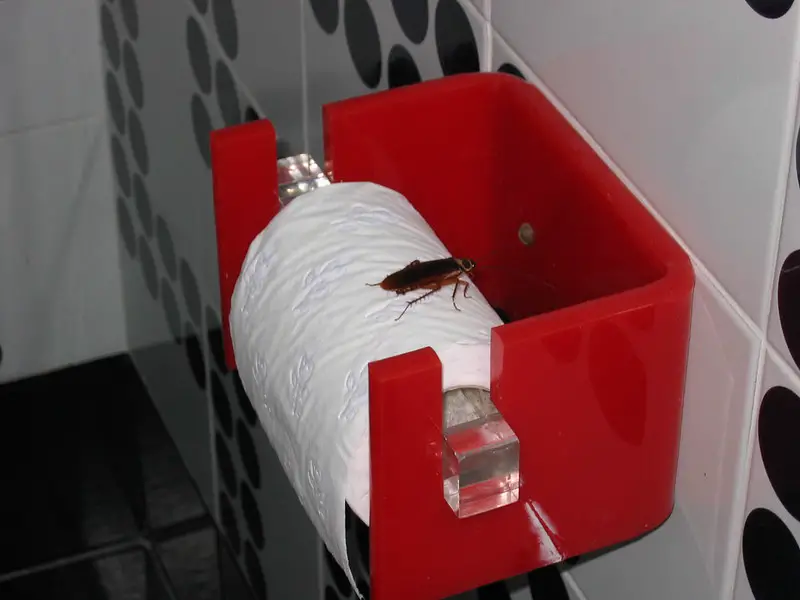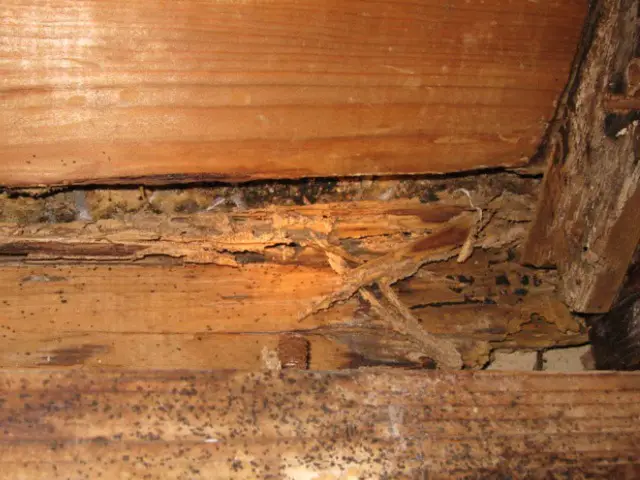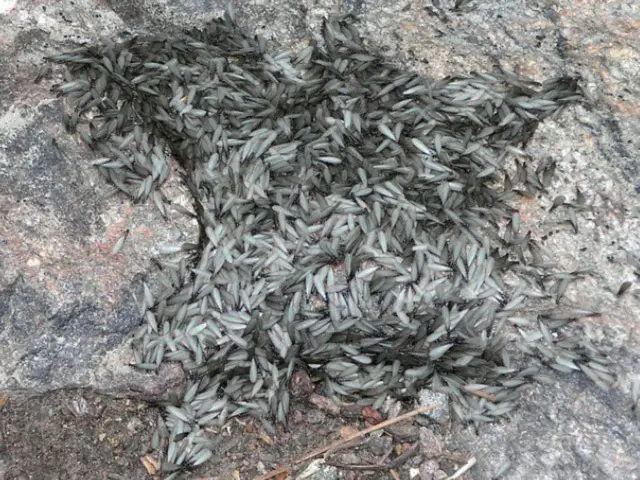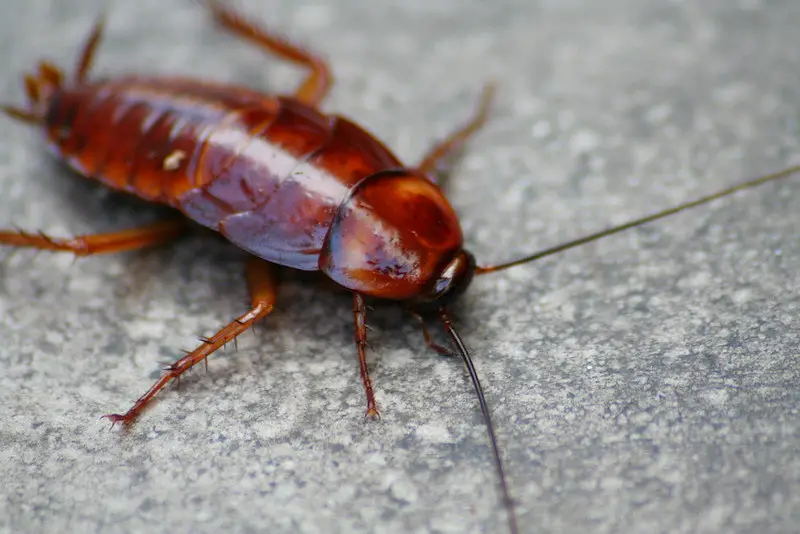Cockroaches are considered to be dangerous. According to the World Health Organization, roaches can carry pathogens that cause diseases like cholera, typhoid fever, salmonellosis, plague, leprosy and more. Roaches can also trigger allergic reactions in people. These nasty bugs can poison our food by transmitting bacteria. Beyond the health risks, roaches also produce a repulsive odor.
What are the potential dangers of cockroaches in your home?
Roaches are well adapted to living around humans. But, unfortunately, cockroaches are an asthma trigger for people and are considered an allergen source.
Cockroaches are not only dangerous, but they are also:
- Triggering emotional and psychological distress;
- Detrimental to human and animal health because of the spread of harmful bacteria;
- Destructive to properties due to damage related to sanitation;
- A threat to household safety.
Related posts:
- How To Keep Cockroaches Away?
- How To Get Rid Of Cockroaches In California?
- How To Get Rid Of Cockroaches In New York?
- Roaches in Georgia: How to Get Rid of Them for Good
- Signs Of A Cockroach Infestation
- Can bleach kill roaches?
- Why do I only find dead cockroaches in my house?
- Cockroaches In Arizona
Can cockroaches hurt you?
The danger that roaches pose to your health can be as simple as having an allergic reaction up to contracting a life-threatening viral infection. Diseases-carrying cockroaches can be a bit frightening, right? That is why you should make sure your home remains cockroach-free.
Cockroaches can hurt you in multiple ways:
- Roaches contaminate food by transmitting bacteria. Cockroaches often enter the home inside food and beverage packaging.
- Cockroaches are responsible for allergy and asthma problems. They produce a large number of allergens that can remain inside your home for months after extermination.
- Roaches cause diseases like Dysentery, Giardia, Poliomyelitis virus, Cholera, Gastroenteritis and more.
- Although uncommon, roaches can bite you. On rare occasions, roaches will eat human flesh, fingernails, dead skin and eyelashes. Fortunately, cockroaches don’t transmit disease by biting humans.
Are roaches a health risk?
Cockroaches are dangerous pests because they carry filth from place to place, contaminate food, and spread disease. Roaches drop feces and disgorge portions of their partially digested food. They have an unpleasant smell due to a nauseous secretion from their glands and mouths.
People hate roaches because of the foul odor they leave behind; plus, they are one of the more disgusting bugs on the planet. Roaches are also notorious carriers of various bacteria and viruses that children can pick up when playing in places where roaches may have walked. In addition, these pests can carry Dysentery, a disease that causes severe diarrhea that may include bleeding; Salmonella Typhi, which causes Typhoid fever; and Poliomyelitis, the cause of Polio.
Cockroaches and diseases
Cockroaches, like all pests, can carry or cause a variety of different health risks, especially when inside your home. What’s worse is often the roaches that carry diseases inside your home do so without you noticing them. These health risks include infections, allergic reactions. They are the consequences of exposure to roach droppings and waste. For example, like mice, cockroaches pick up Salmonella and E. coli bacteria as they rummage through trash and waste.
Roaches have a unique set of health risks associated with them. Therefore, one method of pest control is often insufficient to solve your problems.
Cockroaches spread diseases
Although cockroaches aren’t the nastiest of creatures known to man, they’re not vicious. They’re not aggressive to humans or our favorite pets. However, they can spread disease by contaminating food with bacteria and viruses they pick up in sewage systems, restrooms, trash, etc.
In fact, for the most part, cockroaches are pretty docile and spend their lives looking for food.
Unfortunately…
They will stop at almost nothing to get to their food source, where the problem sneaks in. They will happily walk over whatever type of waste they come across. And once they walk across some rotting matter (or fecal waste), some of the bacteria present in that waste gets transferred onto their feet and legs.
Roaches seem to be immune to most things, and their general foraging allows them to transfer that bacteria to places and things that they “share” with humans. Once they transfer that bacteria onto (for example) the knives and forks in your cutlery drawer, the timebomb starts ticking for us.
Cockroaches are generally not the root cause of a disease, but like houseflies, they have a supplementary role in the spread of diseases. Roaches have carried and transmitted the following diseases to their human neighbors time and time again:
- Salmonella
- Plague
- Leprosy
- Cholera
- Typhoid fever
- Dysentry
- Hepatitis
- Poliomyelitis
- And in the Pasteur Institute, proviral DNA (similar to that found in HIV) has even been extracted from cockroaches retrieved from Central Africa.
Here in the United States, we are safe from some of those, but cockroaches are prolific carriers of Salmonella, and they don’t mind sharing it with us.
Also, more than 50% of asthmatic and skin sensitive people have allergic reactions to cockroach presence and excretions on the allergy front.
Can cockroaches cause allergies?
Cockroach saliva and even decayed cadavers can trigger year-round asthma and allergy. As a result, if you don’t get rid of German cockroaches in your home, it can have long-term health effects. Unfortunately, roach infestations, even after extermination, can have adverse health effects. This is true because decaying cockroaches in attics and walls still produce allergens if not properly cleaned.
Related posts:
- How To Get Rid Of Cockroaches In Texas?
- How To Get Rid Of Cockroaches In Florida?
- Do cockroaches make noise?
- American Cockroach vs. German Cockroach
- Do Mice Eat Cockroaches?
What is a cockroach allergy?
Cockroaches contain a protein called Bla g 2. Bla g 2 is the most important roach allergen, causing an allergic immune reaction. This allergen is found in cockroach gut tissues. Some speculate that this cockroach allergen may be a digestive enzyme. In addition, roach saliva, feces, and body parts are allergens. What’s more, even dead roaches can trigger allergic reactions in people.
Cockroach allergy symptoms:
- Red, watery eyes
- Itchy skin
- Postnasal drip
- Skin rash
- Sneezing
- Cough
- Stuffy nose
- Runny nose
How to be sure that you have a cockroach allergy?
You should see a medical doctor to determine if you have a cockroach allergy. The doctor may conduct a physical examination and discuss treatment options.
How to avoid a cockroach allergy?
The only way to avoid cockroach allergy is to avoid exposure to roaches. Roaches, like all pests, need water, food, and shelter to survive.
You can take the following measures to avoid cockroach allergy:
- Use cockroach traps and baits instead of bug spray. Sprays could also cause an allergic reaction.
- Tightly cover all garbage bins. If that’s not possible, you could place a tray under your trash can and fill it with water.
- Fix leaky plumbing. Water and moisture attract cockroaches to the house.
- Quickly wipe up any spills.
- Don’t leave dirty dishes out.
- Clean your trash can with bleach. Spills in garbage cans can become liquid lunches for roaches.
- Wash pet food dishes after each use.
- Store food items in airtight containers.
- Sweep up food crumbs from the floor, tables, and countertop.
- Seal cracks and crevices in floors and walls to keep roaches out of your home.
- Vacuum at least once a week.
- Regularly mop floors with disinfectant.
Do cockroaches bite?
A cockroach bite is extremely unlikely. If food is scarce and the roach infestation is huge, perhaps cockroaches might bite a human. Roaches bit at night. That makes sense since these pests are nocturnal, and they tend to roam around during the night hours. As a result, you might wake up with cockroach bites on your body.
What does a roach bite look like?
A cockroach bite looks similar to a bed bug bite. It’s bright red and a little larger than a bed bug bite. As expected with insect bites, a cockroach bite will be itchy. An infected roach bite will swell and turn red. It might even have pus.
But these pests are not dangerous because of their bite. Cockroaches become more dangerous in huge numbers. And roaches become more dangerous because there isn’t enough food. Sailers on long ocean voyages have reported that cockroaches have bit the skin and nails of sailors.
Safest and easiest way to get rid of cockroaches
Want to get rid of cockroaches safely and effectively? Do not rely on conventional insecticides to get rid of cockroaches as they are not good cockroach control solutions. Insecticides merely repel cockroaches and tend to only kill cockroaches on the treated surface. Hence, it is difficult to rely on insecticides to get rid of cockroaches as you would have to literally hunt them down. Worse still, killing some types of cockroaches has become somewhat impossible as they have become immune to normal insecticides.
To get rid of cockroaches, you need a long-term cockroach control solution that is safe and effective. The biggest improvement in cockroach control in recent years is the availability of effective cockroach bait that helps you get rid of cockroaches without you having to look for them. This is by far the best cockroach control solution as you can get rid of cockroaches easily without any dangerous side effects.
All you have to do is to use an effective cockroach control bait in and near suspected cockroach infestation areas. Cockroaches that eat the bait will be poisoned, and other cockroaches will also be poisoned when eating dead cockroach bodies. This way, you can get rid of cockroaches and their nest completely once and for all.
If you want to get rid of cockroaches safely and effectively, a good cockroach bait is definitely the best cockroach control solution available.
Diatomaceous Earth, a unique residual-based cockroach bait – helps you get rid of cockroaches safely and effectively. Use it once, and its residual effect can help you get rid of cockroaches in weeks and months to come, unlike conventional insecticides, which only kill cockroaches one-time off.




